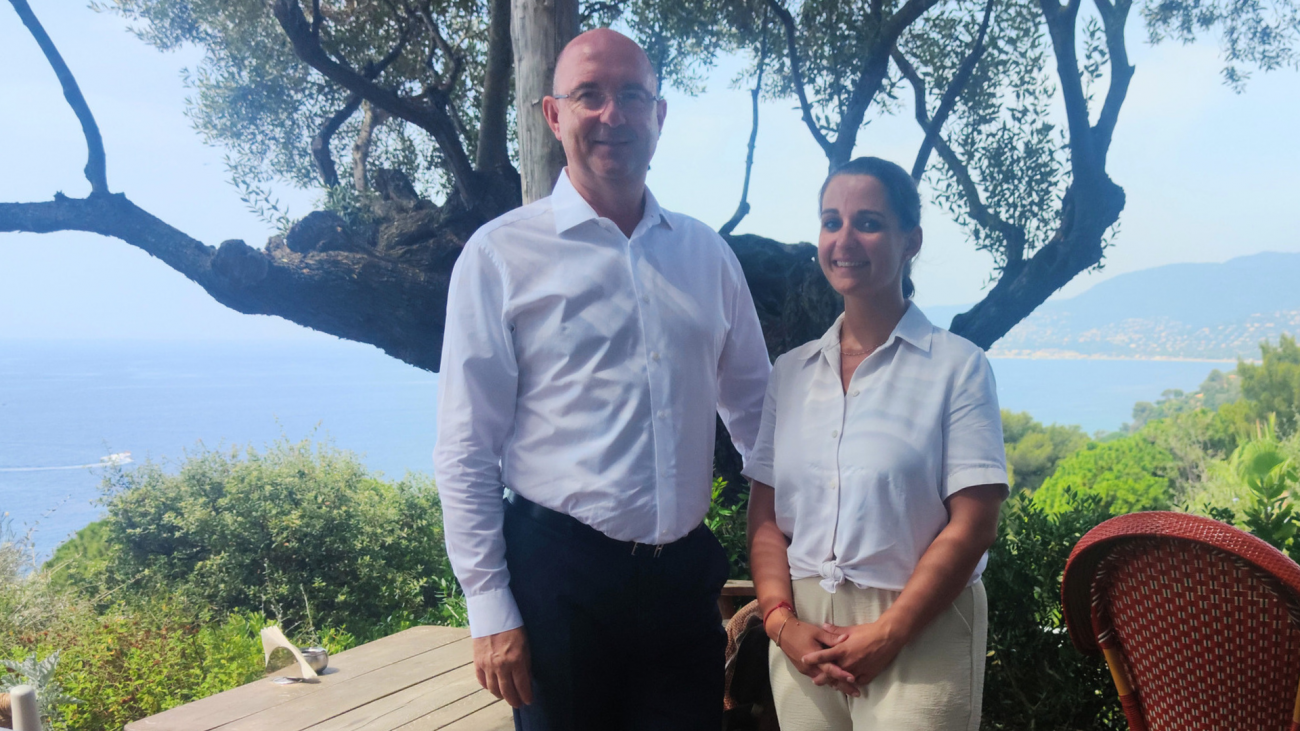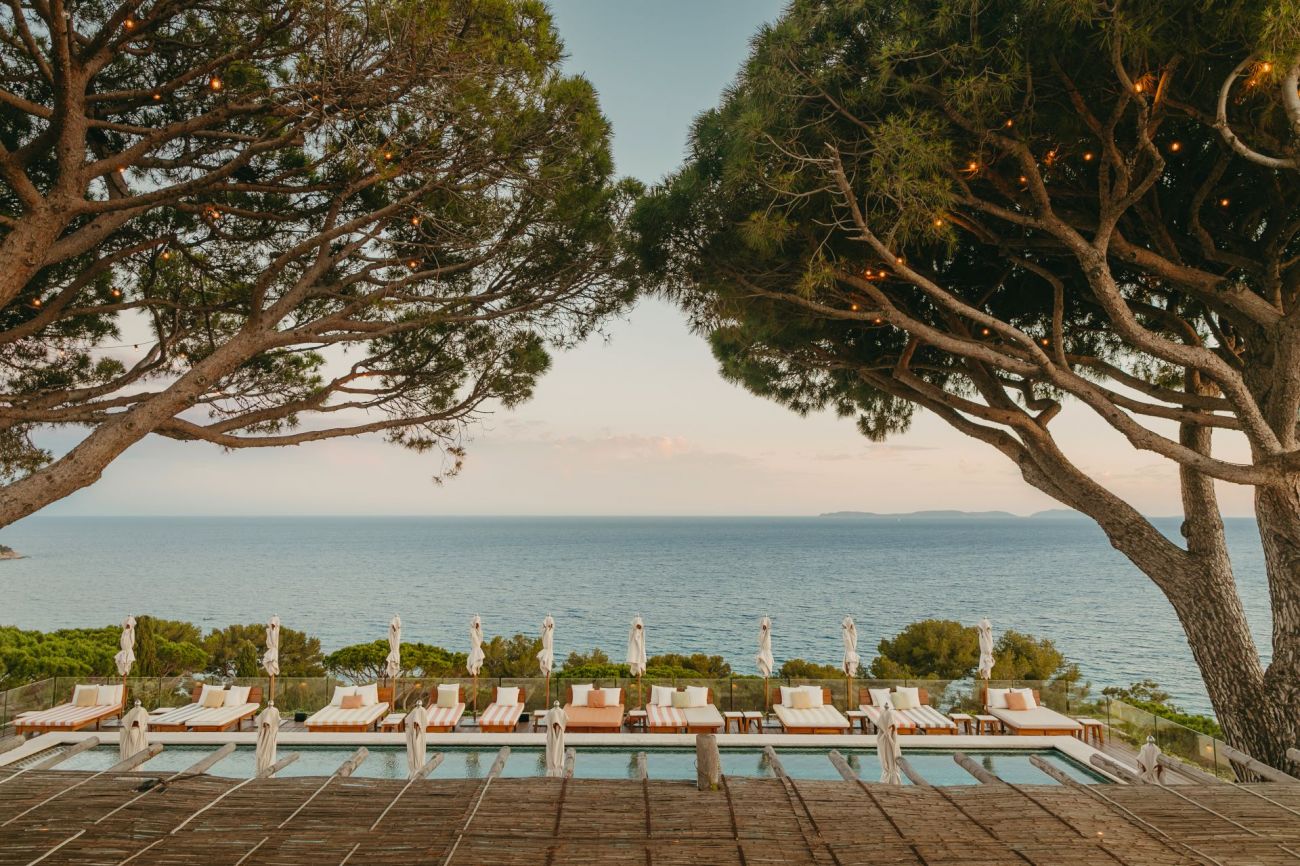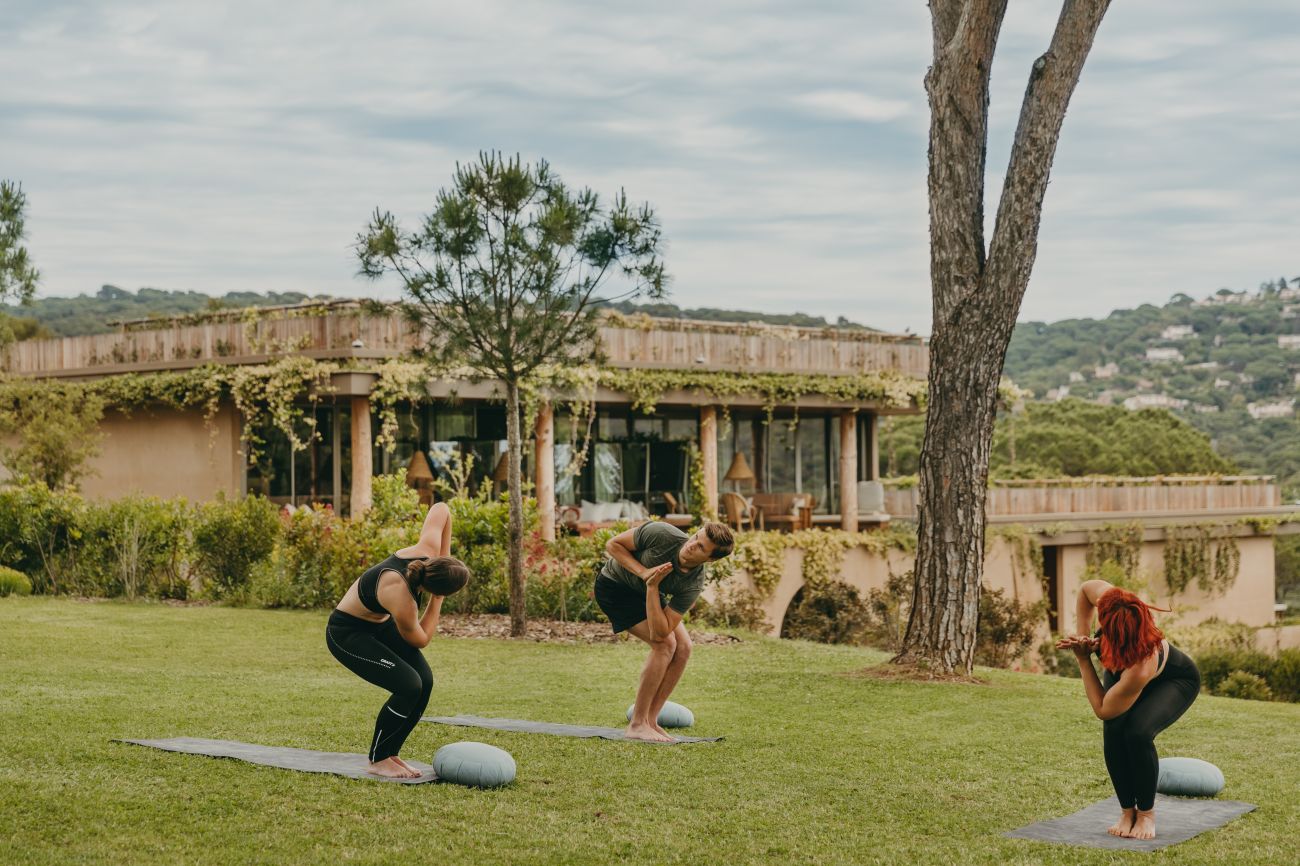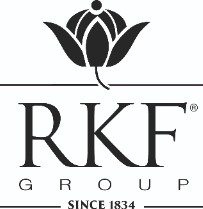
LILY OF THE VALLEY, A LUXURY TEMPLE COMMITTED TO ITS ENVIRONMENT (France)
The genesis of the Lily of the Valley hotel lies in its eco-responsible approach and its desire to commit to its land, its teams, its suppliers and, ultimately, to deliver an authentic, virtuous experience to its guests |
 |
LILY OF THE VALLEY, A LUXURY TEMPLE COMMITTED TO ITS ENVIRONMENT (France)
The genesis of the Lily of the Valley hotel lies in its eco-responsible approach and its desire to commit to its land, its teams, its suppliers and, ultimately, to deliver an authentic, virtuous experience to its guests |
Catégorie : Europe - France - Économie du secteur
- Développement durable
Article rédigé par Vanessa Guerrier-Buisine le 25-07-2023
 Stéphane Personeni, General Manager of Lily of the Valley, and Philippine Leclercq, Marketing and Product Manager
Crédit photo © Vanessa Guerrier-Buisine /
It is in this spirit of respect for nature and deep roots in the French Riviera and Provence that Stéphane Personeni, the hotel's general manager, and his teams have embraced an eco-responsible approach. The hotel has been awarded the little-known 'Esprit Parc National' label, which recognises its commitment to preserving the Port-Cros National Park.
Lily of the Valley is a wellness destination in its own right, and Philippe Starck, who designed the hotel, has deployed his talents to make the hotel part of the remarkable natural heritage of the Gulf of Saint-Tropez. Here, guests come not for the glitz and glamour of Pampelonne, but for an immersive experience. The ESG approach is the very essence of this luxury hotel. From its respect for nature to the care taken to ensure the well-being of its staff, everything is done to ensure that guests instantly embrace the spirit of the place.
The spectacular view over the bay of Cavalaire-sur-Mer and the Golden Islands, accompanied by the Provençal chorus of cicadas, may be the first thing you notice when you arrive at Lily. But every element and every space has been designed to relax guests, summer and winter alike.
The “Esprit Parc National” label
Lily of the Valley is the first hotel in the Gulf of Saint-Tropez in this category to sign up to this precious seal of approval, making it a perfect ambassador for the label.
“The Esprit Parc National brand was created to distinguish agricultural and tourist activities that respect and enhance the region's heritage”, stated the press release announcing the award. As well as validating the efforts made by the hotel's staff, Stéphane Personeni sees the award above all as a way of “shining a light on this label”. “I find it magical that people have been committed, for over 60 years, to protecting such a magical place”.
“The label is a guarantee of respect for our environment and our quality of life,” he continues. “It's a real commitment, for tomorrow's life, for our guests, for our employees”.
In practical terms, Philippine Leclercq, aka Pippa, Marketing and Product Manager, is the main contact for the Port-Cros National Park and the Conservatoire du Littoral. As Stéphane Personeni's deputy, she is “in charge of everything”. It was essential that the resource person for the park should be able to “work on all aspects of the business. From waste sorting and local suppliers, to accommodation, catering, the Shape Club (the wellbeing section of the hotel), the staff canteen, sales and marketing initiatives, technical support… in short, all departments”, explains the manager.
“We have regular meetings, during which we take stock of visitor numbers in particular. Because it's important to know how many people are coming to Cap Lardier, and what we can do internally, with our coaches, for example, who take our guests hiking, mountain biking… We have to train them in the right things to say, while respecting the environment. Our job is to pass on our passion, but also to share our knowledge, both internally and externally, with our customers,” explains Philippine Leclercq. “Some guests are less sensitive, but it's up to us to bring them along, to show them that it's a good thing to do, and to get them moving”, she adds.
From the building to the processes, eco-responsibility is omnipresent
When you're located in the heart of a national park, like Lily of the Valley, people such as the coastal conservation authorities and the architects of Bâtiments de France ensure that the natural environment is respected.
Far from being subject to these 'constraints', the owners of Lily and Stéphane Personeni have chosen to anticipate ecological imperatives. RT 2005 at the time of construction, RT 2012 when the beach was built and now RT 2020, all codes that evoke the environmental standards applied to the site. The owners and Philippe Starck wanted the hotel to be “drowned in vegetation”. And they succeeded, because Lily is so difficult to see from the road or even from the sea. Everywhere, Virginia creeper, jasmine, and other vegetation have taken over the floors and walls, sometimes creating a sense of the Hanging Gardens of Babylon.
“We try to protect nature as much as possible,” says Stéphane Personeni. For example, the concrete was prepared on site during construction, in 2018, to limit the frequent transportation of materials, and the stones were taken directly from the ground, revealing the colours of the region on the walls of the building. Elements of the building have been sourced locally to reduce the hotel's carbon footprint, such as the Provençal canisses covering the terrace, sourced in Cogolin.
The umbrella pines on the Saint-Tropez peninsula, which are suffering from a devastating disease, have just been vaccinated in an attempt to save them.
And while the hotel has set an example in terms of waste sorting, the limits of the model lie at the end of the recycling chain. “We had to find a service provider far away to collect our boxes. We've found a partner to make our compost, and we sort our waste as much as possible, but what's a pity is that the chain doesn't follow,” regrets the manager. He is determined to lead the way in favour of a virtuous luxury hospitality industry.
Although Bâtiments de France did not allow the installation of photovoltaic panels, the hotel compensated by installing a low-voltage switchboard, installing electric chargers and equipping itself with 80% of a fleet of electric vehicles. There's no question of annoying the neighbours with the sweep of cars, here the shuttles move silently.
A committed restaurant
In his restaurants, chef Vincent Maillard gives pride of place to seasonal produce, of course, but, above all, to local producers, including on the wine list. Always on the lookout in this area, the chef continues to seek local suppliers to meet the hotel's needs.
Offering guests this local setting fully meets their expectations of an immersive stay. “People who travel want to experience the place,” confirms Stéphane Personeni. “Guests want something different when they stay here, they want courgette flowers, redfish, rock fish soup. They want to taste local honey, or be able to taste wines from the vineyards they've walked or jogged through,” he explains.
“Promoting local products and suppliers is a crucial point, and we work with them to ensure that prices are respected. What's important to us is that they'll still be there tomorrow”, he continues. To this end, the chef, accompanied by three-star chef Arnaud Donckele, works alongside market gardeners, wine growers and olive growers, who are not familiar with marketing and other sales approaches.
This is a restaurant that is committed to the entire supply chain, but also to the way it welcomes its guests. Inside, there's no air conditioning. Instead, a system of air circulation has been chosen to cool without cooling. Less consumption, less impact. A real challenge, given the heatwaves on the Côte d'Azur, but one that has been met thanks to the use of vegetation, including on the roofs, and the use of natural materials for the building.
The chef also works with local craftsmen, to promote both the know-how and the quality of these suppliers. For example, the Dubosq & Fils workshop in Tourrettes-Sur-Loup in the Alpes-Maritimes, which has been awarded the Entreprise du Patrimoine Vivant (Living Heritage Company) label, supplies the olive wood cuttings used at the chef's table.
An eco-responsible and societal approach
The teams are the first to commit themselves, even if it means having a tougher job. No chemicals are used to treat linen, “all cleaning is done with dry steam”, says Stéphane Personeni. Room services are adapting and embracing the approach.
Philippine and the teams also organise beach cleaning operations, and the staff are constantly being made aware of the issue, through a welcome booklet and training courses on the use of equipment, sorting, etc. The teams are rapidly becoming real green ambassadors in the hospitality industry.
Teams that are pampered and receive special attention. That's how Christelle, the accommodation and seasonal worker manager, looks after her staff. She takes on many roles: concierge, personal assistant for medical appointments, etc. “She looks after them like children,” adds the general manager. Here, in the human resources department, there is a team dedicated to staff. Technicians manage accommodation, people accompany employees on shuttle buses, people also help them the staff with the local council to find a place in a crèche, and so on. Lily of the Valley even finances cots for the municipal nursery, to ensure that young parents have a comfortable life.
Of the 400 members of staff, 280 enjoy accommodation provided by the hotel. These teams benefit from a free shuttle service between the hotel and the various accommodation units. This approach serves a triple objective: to respect the environment, to solve a parking problem in the vicinity of the hotel, and to improve the quality of life at work for its teams.
As an extension to this accommodation for seasonal workers, the owners have just acquired land to build on. They will “dedicate part of it to seasonal workers, as well as part to people who live here all year round so that they can buy their accommodation at more competitive rates than in the Gulf”.
Active guests
The guests who choose Lily of the Valley are sometimes passive, but often active. They adhere to the hotel's philosophy, and “want to take part in protecting the area”, adds the general manager.
“We're lucky enough to have only 53 keys, so I welcome every guest. We explain our approach to them, we discuss what we do and what we want to put in place, it's very important,” he continues.
While they come in the summer to experience the Côte d'Azur seaside, many stay at Lily of the Valley in the winter to take care of themselves. “Our guests come for a reboot or a little body reset, for a detox, with a lighter cuisine, a gourmet cuisine, but always healthy, with local produce”, explains Stéphane Personeni. Coaches and nutritionists accompany guests from A to Z to help them get back into sport, lose weight and feel rejuvenated for the duration of their stay. Many locals, from Marseille to Monaco, choose Lily to regenerate between seasons.
“For this to work, everyone has to win. Nature comes first, but our environment and the people who benefit from it - the tourists who come, us who live there, the seasonal workers, the suppliers, the locals - have to win together, in harmony” concludes Stéphane Personeni.
These are signature commitments that travellers will no doubt be delighted to see again in a future Lily of the Valley, planned for Courchevel.
 Lily of the Valley overlooks the beaches of Gigaro in La Croix-Valmer
Crédit photo © Lily of The Valley
 At Lily of the Valley, the emphasis is on activities that help guests to connect with themselves and with nature
Crédit photo © Lily of The Valley
 Coaches accompany guests and raise their awareness of the importance of respecting the Port-Cros National Park
Crédit photo © Lily of The Valley
|
|






